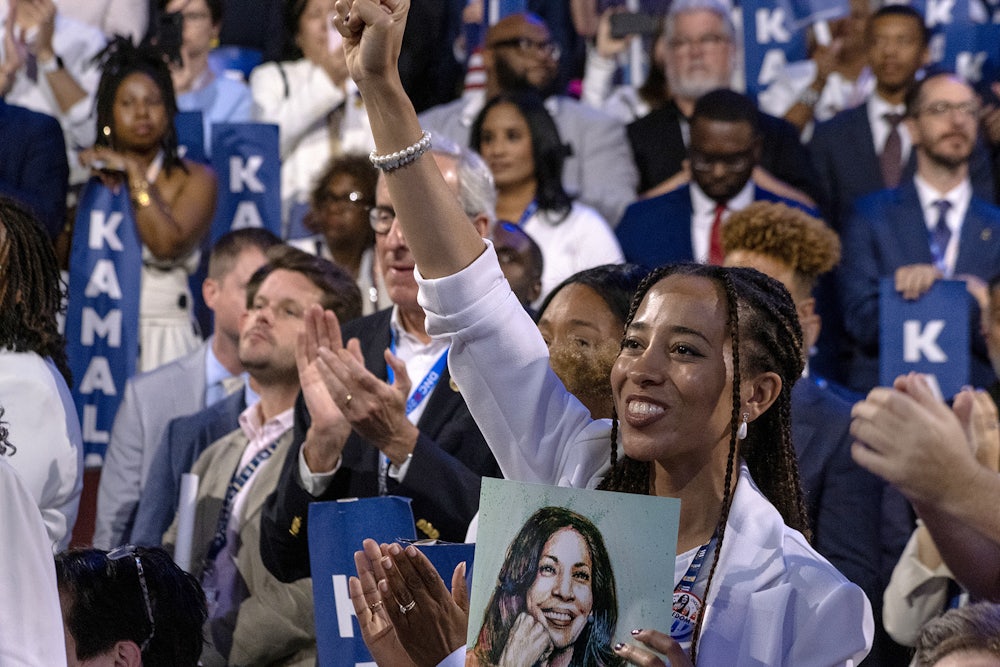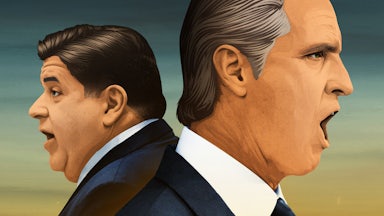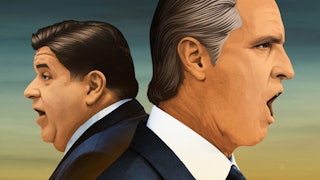When Bill Clinton took the stage on the third night of the Democratic National Convention in Chicago, he wasn’t scanning the crowd to gauge their reaction the way he usually does. Instead, he was constantly glancing down at the dais. Clinton wasn’t reading from the teleprompter; his speech had been printed out. “Bill Clinton is reading ... pages of actual paper,” the longtime political reporter Susan Milligan tweeted. “Which, for those of us who started covering him in the ’92 campaign, means he didn’t finish his last version of his speech in time to load it on the teleprompter.”
Clinton wasn’t just fiddling with syntax. After observing the first two days of the convention, he had decided to rewrite his remarks “with a more fun, youthful, joyful approach” that fit the mood he had witnessed inside the United Center. “Take it from a man who once had the honor to be called in this convention the Man From Hope,” he concluded. “We need Kamala Harris, the president of joy, to lead us. So, I’ll be doing my part. You do yours. I’ll see you when we’re making a real joyful noise when the votes are counted.”
It was, to be blunt, not one of Clinton’s better speeches—long and droning, it resembled his disastrous 1988 address more than career highlights such as his reelection-shifting 1996 speech or his effusive case for Barack Obama in 2012. (It was also Clinton’s thirteenth convention speech, so it’s hard to fault him too much.) But it was yet another testament to the former president’s well-honed ability to read the room. The theme of the 2024 convention was joy; Clinton simply put his own spin on it.
Much of that joy was Kamala Harris’s. Democrats had rightly decided that exuberance was her defining characteristic, and spent four days making the case that in her the party had, at long last, its own happy warrior. But joy was also present in the United Center itself. It belonged to the delegates, too. The mood at the 2024 DNC was jubilant because everyone was well aware of how funereal things would have been if Harris wasn’t the nominee. Had Biden held on, the convention would have likely taken place with Donald Trump rollicking toward a landslide return to the White House; moreover, there likely would have been massive protests against Biden’s role in Israel’s ongoing murder of civilians in Gaza. The media would have labeled it a reprise of the disastrous 1968 convention.
Instead, Harris was the nominee; the protests were present but muted; and the Democrats, though still facing a tight election, were favorites. All of this was un-imaginable just one month earlier.
The sense of unity inside the United Center was just as improbable. In mid-July, the party felt like it was on the brink of civil war. By late August, all of that had been forgotten: The party was in lockstep behind Harris. Indeed, some of the best speeches of the convention came from progressives, particularly Bernie Sanders and Alexandria Ocasio-Cortez, who made an impassioned case that electing Harris was necessary to improve the lives of working people. Full of love for unions, denunciations of billionaires and corporations, and calls for crackdowns on corporate greed, the convention was a monument to the legacy of Sanders’s failed 2016 presidential bid.
If Sanders’s and Ocasio-Cortez’s speeches served as reminders of the surprising success of the Democratic Party’s progressive wing over the last eight years, it was also clear that the party had largely subsumed that movement, rather than the other way around. There was, at the same time, a sense that many of the party’s dominant figures were, well, quite old. Several speeches had a distinctly valedictory feel: Clinton (who is 78), Sanders (who is 82), Biden (who is 81), and Nancy Pelosi (who is 84) were all received as if they were delivering a final address. Biden, in particular, elicited a solemnity that sharply contrasted with the otherwise buoyant spirit of the convention: His speech was treated as if it were a farewell, and not one of many addresses a sitting president will deliver in his final five months in office.
The old order was dying. Where was the new one? In Chicago, it wasn’t always obvious. The Democratic Party’s retreat from neoliberalism has never been clearer. These Democrats are vociferously pro-union; they spent the convention cheering on Biden’s embrace of full employment, domestic manufacturing, and use of legislation to remake the American economy. There was more talk of egalitarianism than at any recent convention—but it was hardly socialistic. Instead, the convention broadly reflected the Biden administration’s own approach to policy, which represents a fusion of the finance-heavy approach favored by Obama and Clinton and the more academic approach of Elizabeth Warren (with a dash of Sanders’s populism).
This fusion may very well be the future, but it still feels transitory. The Democrats are headed somewhere, but no one quite knows where yet. Harris, who has largely eschewed policy, doesn’t appear to have an answer—indeed, her lack of a vision for the party is one reason her 2020 presidential campaign fizzled. For now, her indistinctness is appealing. In Chicago, most voters could see in her whatever they wanted to see. The party is united behind her, a candidate who is a little bit of everything without being too much of anything. But at some point, the party will once again have to get down to the tough business of existential politics. Till then, there is joy. Much of it comes from the simple fact that Harris is the nominee. But some of it comes from the understanding that those questions can wait—for a few months, at least.






